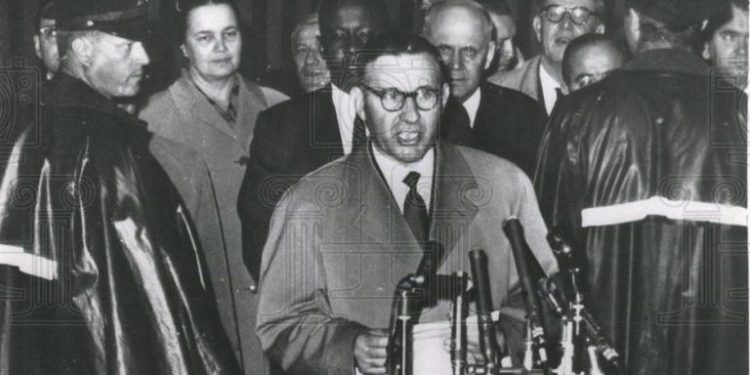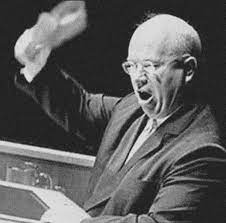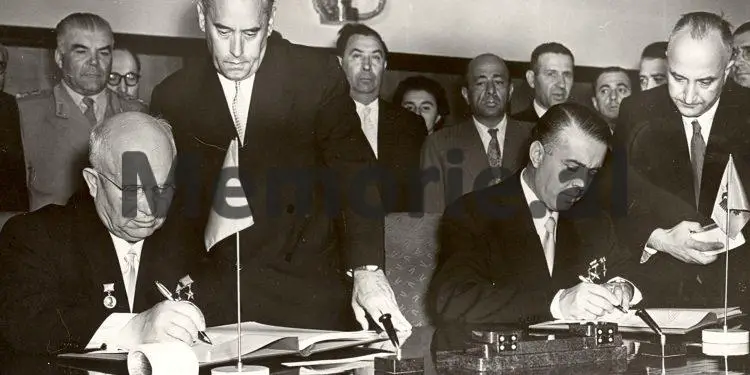Memorie.al / Some time ago, we published an article that, more than about former Prime Minister Mehmet Shehu, was exclusively about the profiles of all the communist leaders (prime ministers, first party secretaries, or both functions combined) who would accompany their spiritual leader, Nikita Khrushchev, on his tour of the UN in 1960. After the conclusion of the UN plenary session—which, in fact, is not the main subject of our article—while the Sino-Russian clashes were clearly outlined and Albania’s break with the Soviet Union was only a matter of time, the American magazine ‘TIME’ once again provides some very interesting details. This time, it’s about the behavior and deliberate ignorance that Khrushchev and other satellite leaders had reserved for the Albanian Prime Minister, Mehmet Shehu, who seems to have been in a difficult spot at that moment. But, let’s look in more detail at what the TIME article from October 24, 1960, titled “Odd Man Out,” reveals:
“Among the satellite leaders gathered in Manhattan to play second fiddle to Nikita Khrushchev, one of them seemed the most lonely and forgotten. The Red Prime Minister, Mehmet Shehu of Albania, was not on the passenger list of the “Baltika” and traveled to Manhattan as a simple passenger aboard the “S.S. Queen Elizabeth.”
At a reception organized by the Czech communists, Shehu stood lost in a corner of the hall, left abandoned and deliberately shunned by all present, except for a State Department security man, listed as his bodyguard.
And when, at a reception given by the Romanian communists, Khrushchev took his old satellite comrades by the arm for a conversation, and Shehu started to follow them, the door was slammed in his face. Shehu, most likely, later asked for an explanation as to why such a thing had happened.
At the UN, Shehu was visibly much more rigorous and harsh in demanding the right of Red China to be admitted to the organization, while at the same time giving great echo to China’s accusations that Russian communism was losing its ideological militantism because it feared atomic war.”
Americans: A Mystery Why Albania Is Siding with China?
In the same ‘TIME’ magazine article (“Odd Man Out”), dated October 24, 1960, we also encounter the “dilemma” of the article’s authors, or rather, the Americans, in trying to find the true reasons for Albania’s recent actions at the time—siding with China and breaking away from the Soviet Union.
Much was still happening “underground,” within the socialist camp, so it must have been truly difficult to figure out what was really going on. However, ‘TIME’ lists a series of reasons that, according to them, attempt to explain the mystery surrounding Albania’s action.
We specifically quote the paragraph that sheds light on what we claimed above:
“Albania is the only European communist satellite country that seems to have already chosen Beijing in the internal ideological conflict between Russia and Red China. In June, when Khrushchev called on all satellite party chiefs in Bucharest to ratify his policy of peaceful coexistence, the First Secretary of the Albanian Communist Party, Enver Hoxha, was the only senior communist leader who was absent.
And Albania was the only communist country from Europe that sent a special representative to Beijing to celebrate the 11th anniversary of the Red Chinese Revolution this month. But why should tiny Albania, with an area (10,630 square miles) smaller than the state of West Virginia and with fewer inhabitants than Detroit, have sided with Red China against the Russians? This still remains a mystery!
Part of the answer, in this case, might be its poverty; Albania has only 5,000 cars, trucks, and buses, and, like Red China, it feels it must keep the spirit of class struggle alive to prevent its people from rebelling against oppression.
But another reason for this action is also a coincidental geographic accident: Tito’s Yugoslavia, Albania’s longtime enemy and neighbor, is currently the main target of Chinese criticism, and Albania, most likely, seeks to exploit the old slogan: “The enemy of my enemy is my friend.”
It would be entirely sufficient for Tito’s independence to give Albania the opportunity to be somewhat independent of Moscow. Since Tito broke relations with the Kremlin in 1948, Albania has been physically isolated from other satellite countries and separated from Russia by its border with Yugoslavia and Greece.
Part of Albania’s interests in supporting Red China could also be simply economic and financial: to finally minimize Albania’s financial dependence on Russia, Red China, last year, gave Albania an interest-free loan that amounted to 5.5 million dollars.” / Memorie.al
(“A Mystery Why Albania Is Siding with China” – “TIME Magazine” – Monday, October 24, 1960)














